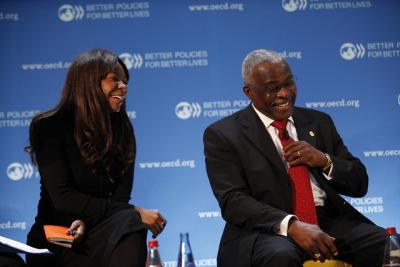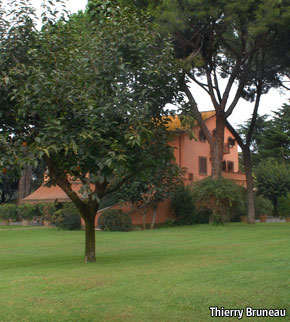IFAD President returns to public eye after scandal

HELSINKI– The International Fund for Agricultural Development (IFAD) President, Kanayo Nwanze, has made one of his first public appearances since his position was thrown into jeopardy by the scandal over his sky-high housing expenses, diplomatic sources say. Mr Nwanze met senior officials in Helsinki and Oslo “to find solutions for the immediate needs in the Horn of Africa and to discuss the longer term needs to build resilience of smallholder farmers in the region and in developing countries worldwide.”
“IFAD remains united with countries like Norway and Finland in our vision of a world without hunger and poverty,” Mr Nwanze asserted prior to his departure for the two Nordic countries from Rome. “The catastrophic impact of the drought in the Horn of Africa underscores the importance of focusing, now, on smallholder farmers vulnerable to climate events. We must link the immediate support needed to that of longer-term needs to build the resilience of smallholder farmers.”
Both Norway and Finland were among the first countries to respond to the crisis in the Horn of Africa pledging a combined amount of about dlrs 70 million in humanitarian aid.
Historically, Norway has supported agricultural development, with its overseas development assistance at dlrs 74 million in 2009. In Norway, Mr Nwanze met with State Secretary of Development Ingrid Fiskaa and senior officials in the Ministry of Foreign Affairs, as well as with Norwegian ambassadors to East African countries to get a clearer understanding among the stakeholders how best to support governments to create stronger policies for rural development and infrastructure. In addition, Nwanze delivered a keynote address to incoming students at the invitation of the Norwegian University of Life Sciences.
“IFAD has been working for more than 30 years to enable rural communities to create the conditions where they can achieve household food security, and also to produce a surplus to take to market,” Nwanze said. “And we have seen that smallholders can flourish if they have the right rural infrastructure and social services to support them. And they can thrive using simple but effective environmental practices that restore the ecological environment and increase resilience.”
Also, women smallholder farmers – who in sub-Saharan Africa women provide 80 to 90 percent of the labor required to produce basic food crops – “should not be forgotten,” Mr Nwanze said.
The senior poverty buster also claimed: “No nation, no society can progress by supporting only half of its population.”
Many studies indicate that when women earn money, they are more likely than men to spend it on food for the family. In Cote d’Ivoire, for example, a dlrs10 increase in women’s income was found to bring about the same level of improvement in child health and nutrition as dlrs 110 increase in the income of men.
While in Finland, Mr Nwanze met with Finland’s new Development Cooperation Minister Heidi Hautala and Agriculture and Forestry Minister Jari Koskinen. Their discussions focused on further strengthening the partnership between IFAD and Finland, particularly on natural resource management, which aims to address the greater competition for access to land and water caused by climate change, rising food and commodity prices and urbanization.
Mr Nwanze emphasized that his visit comes at a crucial time, when building partnerships is vital to solving a crisis like the one in the Horn of Africa.
“Each of us brings our individual strengths to bear in the common cause of ensuring food security and nutrition,” he said. “If donors, development agencies and governments do not attend to the medium and long term, the kind of tragedy we are seeing in the Horn of Africa will happen again.”
Mr Nwanze and his family moved out of his sprawling villa complex at the end of last year as the furore over his lifestyle raged though there was speculation that he may have relocated to an only slightly less grandiose abode on the Appian Way. Since then the foid agency supremo generally has kept a low profile compared with his gung ho approach to the agency when first elected, IFAD sources say.
(additional reporting: Jan Filipowicz)



